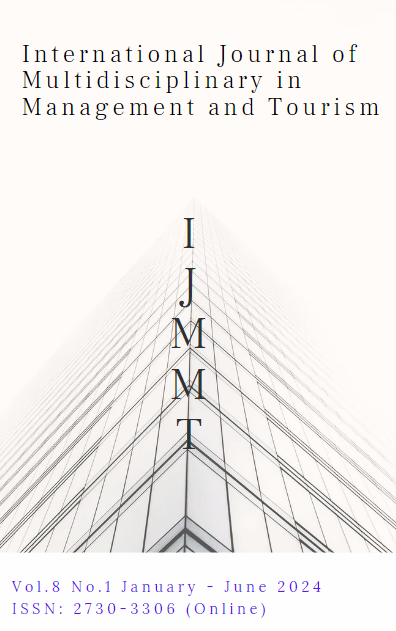Outcome-based Program Design for a Business English Syllabus in the Post-Pandemic Era
Main Article Content
Abstract
Developing a fulfilling and comprehensive syllabus appears to be the prerequisite of any quality and well-balanced language program. It is a challenging task that many ESP (English for Specific Purposes) have to encounter at some point in their professional life. This paper is written to show the development of a Business English syllabus which can draw on information obtained from some recent alumni of the Business English program on the basis of needs analysis, a useful approach that can be effortlessly transferred. The focus will be placed on actual students’ needs pertinent to the circumstances where students practically need English language skills and a threshold when students’ learning outcomes reign supreme. It was concluded that by organizing a curriculum in an educational system around what is necessary for the students to be able to achieve would fulfill skills and knowhow they truly need in the real professional life, and yet the implementation of the revised syllabus needs further investigation to ascertain its spiraling, positive expected outcomes.
Article Details

This work is licensed under a Creative Commons Attribution-NonCommercial-NoDerivatives 4.0 International License.
References
Alhamami, M., & Ahmad, J. (2018). EFL Teachers’ Attitudes toward Commercial Textbooks in EFL Programs. Arab World English Journal, 9(4). 69- 87. https://doi.org/10.31235 /osf.io/qku62
Barak, M. & Portnov-Neeman, Y. (2013). Exploring students’ perceptions about learning in school: An activity theory based study. Journal of Education and Learning, 2(3), 9-24. https://doi.org/10.5539/jel.v2n3p9
Crawford, J. (2002). The role of material in the language classroom: Finding the balance. In J. C. Richards & W. A. Renandya (Eds.), Methodology in English teaching, An anthology of current practice (pp. 80-89). Cambridge University Press.
Derwing, T. M., & Rossiter, M. J. (2002). ESL learners' perceptions of their pronunciation needs and strategies. System, 30(2), 155-166. https://doi.org/10.1016/S0346-251X(02)00012-X
Foung, D., & Kohnke, L. (2023). Beyond replication: An exact replication study of Łodzikowski (2021). ReCALL, 35(2), 225–238. https://doi.org/10.1017/S0958344023 000071
Haycraft, J. (1998). An introduction to English language teaching. Longman.
Hoofd, C. & Liangpanit, C. (2022). Thai high school students’ reflections on role-play activity in Thai EFL speaking class. Journal of Modern Learning Development, 7(6), 115 - 121.
Huhta, M., Vogt, K., Johnson, E., Tulkki, H., & Hall, D. R. (Eds.) (2013). Needs analysis for language course design: a holistic approach to ESP. Cambridge University Press.
Hutchison, T. & Waters, A. (1987). English for specific purposes: A learning-centered approach. Cambridge University Press.
Kaliannan, M., & Chandran, S. D. (2012). Empowering students through outcome-based education (OBE). Research in Education, 87(1), 50-63. https://doi.org/10.7227/RIE.87.1.
Lixun, W. (2011). Designing and implementing outcome-based learning in a linguistics course: A case study in Hong Kong. Procedia Social and Behavioral Sciences, 12, 9-18. https://doi.org/10.1016/j.sbspro.2011.02.004
Malik, A. Z., & Paswan, A. (2023). Language-related stereotype threat, customers’ well-being and its outcome. Journal of Services Marketing, 37(7), 895-910. https://doi.org/10.1108 /JSM -07-2022-0245
Oviedo Gómez, H. H., & Álvarez Guayara, H. A. (2019). The contribution of customized lessons with cultural content in the learning of EFL among undergraduates. Colombian Applied Linguistics Journal, 21(1), 15–43. https://doi.org/10.14483/22487085.11877
Richards, J. C. (2001). Curriculum development in language teaching. Cambridge University Press.
Sheldon, L. (1988). Evaluating ELT textbooks and materials. ELT Journal, 42(2), 237-246. https://doi.org/10.1093/elt/42.4.237
Tam, M. (2014). Outcomes-based approach to quality assessment and curriculum improvement in higher education. Quality Assurance in Education, 22(2), 158-168. https://doi.org/ 10.1108/QAE-09-2011-0059
Tatyana G. B., Gayane A. G. & Natalia A. K. (2015). Case Study as an Active Method of Teaching Business English. Procedia - Social and Behavioral Sciences, 166, 292- 295.
Yasmin, M., & Yasmeen, A. (2021). Viability of outcome-based education in teaching English as a second language to chemical engineering learners. Education for Chemical Engineers, 36, 100-106. https://doi.org/10.1016/j.ece.2021.04.005

